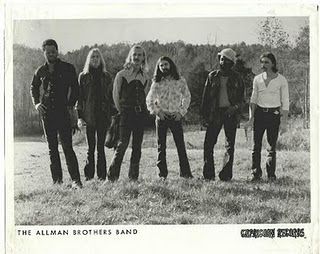In the latter half of the 19th century, railroad travel revolutionized the psyche of the American people. Culture and philosophy from the South could now permeate the North, and vice-versa, delivering national solidarity and fraternity that railways today still provide.
In the same way, Butch Trucks, christened “The Freight Train” as founding member and drummer for the Allman Brothers Band, incalculably impacted the American people in the latter half of the 20th century. In their over forty years together, the ABB traversed and transformed the American frontier, sweating Southern blues into American soil to fertilize and romanticize nostalgia for simpler times.

I recently spoke to “Freight Train” Trucks in preparation for the Allman Brothers Band’s four-night engagement at Boston’s Orpheum Theatre at the end of November through early December. At 64, Trucks doesn’t play three hundred shows a year like he used to, but still remains ferociously attached to the America of blue sky, mountain jams, and midnight riders of yesteryear.
“What the fuck is wrong with this country?”
This was the tenor that dominated most of our conversation, despite my novice attempts to bring the conversation back to music.
“Right now, we have about 400 families that own this country lock, stock, and barrel, the 99% are getting really screwed by the 1%… what the hell do you do about it? I mean, the best we can do is try some kind of Revolution.”
Proclamations for plebian uprising are fascinating when issued from a man with ten gold records, a Grammy, and membership in the Rock & Roll Hall of Fame. Still, Trucks champions Occupy Wall St. and suggests that the U.S needs to return to its agrarian roots to minimize wealth stratification in the country. How Jean-Jacques Rousseau of Trucks.
Yet, on second thought, Trucks’ obsession with a return to quintessential Americana isn’t all that surprising. For nearly a decade, the ABB were based in Macon, Georgia where the heartland – and music – are quilted into the culture’s fabric.
“We were out playing music just for the sake of playing music,” Trucks explains. “We hated all that damn picture taking. And interviewing, doing the kind of thing that I’m doing right now!” he jokingly chastises.
Trucks’ explanations evoke the ABB’s spiritual connection to music, as if the contributions of the individual band members are superseded by their performance as a whole because it can transcendentally unite the listeners, the frontier, the Native American spirits that still possess their Georgia homeland.
“We played 300 shows a year and if we didn’t have a gig booked, we’d just find a park and set up to play for free. Music was the most important thing.”
Yet, as the ABB reaped the fame they had toiled so long to harvest, their symbiotic relationship with music and fraternity within the heartland was soon severed.
“Celebrity is the worse thing that ever happened to the Allman Brothers. Before Duane died, we were a very, very, close-knit family,” explains Trucks, emphasizing the unifying role Duane Allman, considered one of the, if not the, best guitarists of all time. “We partied, but if partying was getting in the way of music, then you had to deal with Duane. “
But after Allman’s death in 1971, Trucks explains that the ABB “got away from that, even got away from the music.” The ABB’s emphasis on explicating the intricacies of blues grizzled into “country-fried hit records,” which simultaneously garnered nationwide fame and alcohol, drugs, and egos that “ripped [them] all apart.” Upon their breakup in 1976, a devastated Trucks returned to the heartland to raise a family and return to school.
Nowadays, however, The Freight Train explains that the mature and sobered Allman Brothers Band is “doing it right.” As the ABB haven’t played since earlier this year, Trucks explains that he’s “jonesin” to play drums again, a term he delights in defining for a naïve reporter. He has the insatiable thirst of an addict; he must play.
“We start locking in, the juices start flowing. There’s no tomorrow, there’s no yesterday, you’re there in the moment, there’s no pain, and even though you’re playing three-hour sets, you’re not tired, you’ve got all this energy. When I get up to play music now, that’s my drug.” The Allman Brothers Band has returned to roots.
As for Trucks, The Freight Train is actually relocating to France. While initially uncharacteristic for a man so indelibly intertwined in the American fabric, deeper examination reveals that this move is not a betrayal, but rather an embrace of Trucks’ past. Revealed in his orations on the “fall of the American Empire,” Trucks longs for the amber waves of grain and brotherhood the ABB found as they manifested their own destinies across the American frontier. He longs for a simpler time that is, for now, lost.
That said, it’s clear that The Freight Train will keep chugging across from sea to shining sea until he can find that time again. Keep on jonesin’. Keep on Truckin’.
The Allman Brothers Band plays Boston’s Orpheum Theatre on November 29th and 30th as well as on December 2nd and 3rd.
This is an account occasionally used by the Daily Free Press editors to post archived posts from previous iterations of the site or otherwise for special circumstance publications. See authorship info on the byline at the top of the page.



